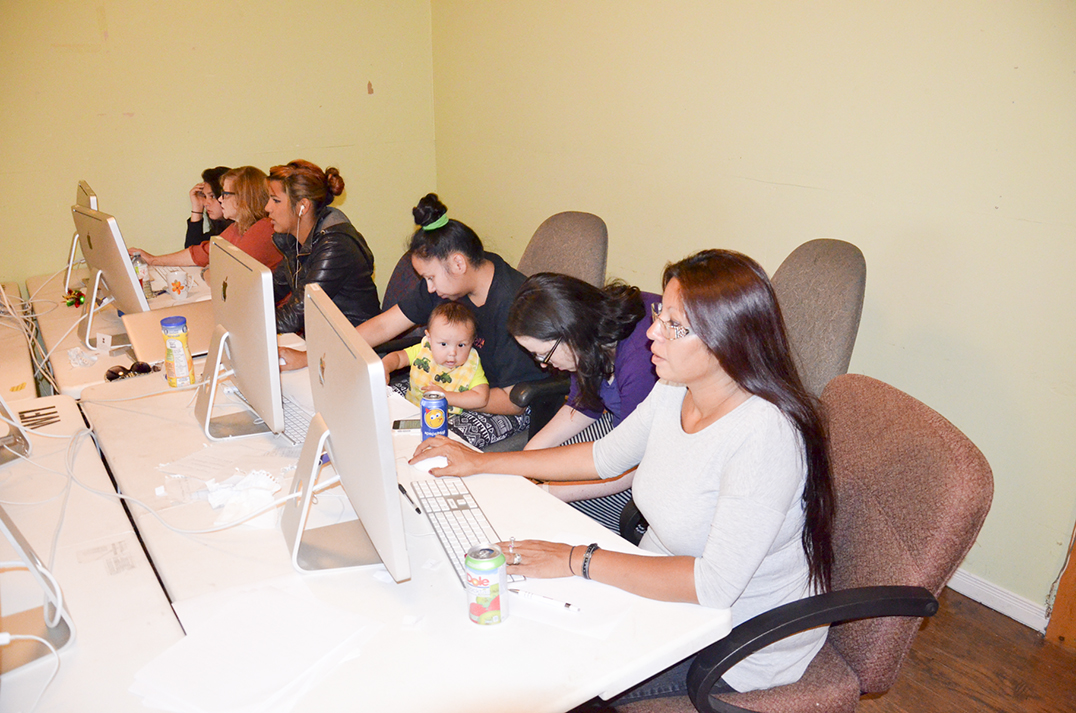M’CHIGEENG—The studios at Weengushk Film Institute (WFI) were bustling over the past few weeks as a team of novice women filmmakers tackled the production of eight original short films with footage captured on film with Super 8 movie cameras.
Female Eye festival director and founder Leslie Coles noted that the purpose of the workshops, funded by a grant from the Canada Council for the Arts, discussed the purpose of the project and the history of how it came about.
“The purpose is to give these young (and not so young) women an opportunity to tell their story in a creative way,” she said.
The project came about through a discussion between Ms. Coles, originally from New Brunswick but who now makes her home in Woodbridge, about 30 minutes north of Toronto, and renown female Cree filmmaker, artist and WFI founder Shirley Cheechoo of M’Chigeeng. “We met in January in Toronto,” recalled Ms. Coles. She was familiar with Ms. Cheechoo’s body of work and the pair soon found themselves building a concept founded on common ground.
The result of that collaboration is the current program involving students aged 13 to the late-20s from the First Nations of M’Chigeeng, Eabametoong, Zhiibaahaasing and Wikwemikong.
Each student is given two rolls of Super 8 film with which to capture the images that will tell their stories. “Super 8 is experimental as there is no sync to sound,” she said. Unlike a digital camera, the Super 8 film cameras have a finite limit on the amount of imagery that can be captured, students have to consider each shot and sequence carefully to husband their resources and create a compelling story.
Most of those stories tend to revolve around contemporary issues, particularly the plight of missing and murdered aboriginal women. Each of the students knows and/or is related to someone who has been lost to violence and abuse, so those themes are among the most compelling of the stories that the students want to tell.
The students gathered as a group to review the concepts and storyboards of each of their ideas, settling on eight stories that will be filmed. “They are strong story ideas,” said Ms. Coles. Under the mentor directorship of Ms. Coles and two other filmmakers paired up with the students as director-mentors.
Once the raw filming had been wrapped up, Ms. Coles was to take the film back for processing, returning to the field in November. The plan is to hold a community screening of the eight works on Sunday, November 8 and then to have the films presented at the 2016 Female Eye Film Festival.
This will be the 14th annual edition of the Female Eye Film Festival, which has won the Moviemaker Top 50 Film Festivals Worth the Entry Fee Award for the last three years running.
With the motto ‘Always honest, not always pretty’ the entries into the Female Eye Film Festival must be directed by a woman. “We present independent films in all genres by filmmakers from around the globe,” notes Ms. Coles. “Any and all subject matters, themes and lengths are accepted as long as the film is directed by a woman.”
The Female Eye is a juried competitive film festival and awards at the festival are presented for Best Films and Best Screenplays annually. Film awards include: Best of Show (all lengths and genres eligible); Best Film, Best Debut Director, Best Feature, Best Foreign Feature, Best Documentary, Best Short, Best Animation, and Best Experimental. All films submitted in competition qualify to compete in all award categories. Each year an Honourary Director Award is presented at the closing night of the festival to an internationally recognized director.
The early deadline for entries to the Female Eye Film Festival is (postmarked by) September 30, 2015, with an entry fee of $30 (student fee $20) and if in competition, the fee is $100. The regular deadline is December 31, 2015 with a fee of $45 (student fee remains $20) and the late deadline is February 29, 2016 with a fee of $60 (student fee $25). For those who are particularly deadline challenged there is an extended deadline of March 31, 2016, but be prepared to pony up a $70 (student fee $45) entry fee. For all deadlines the competition fee remains $100.
Weengushk Film Institute (WFI) is a not-for-profit artist-focused, film and television-training centre, dedicated to unlocking the creative potential while developing market leading skills and experiences to its participants, WFI provides significant value by creating a mentorship network between participants engaged in learning and senior media industry professionals.



